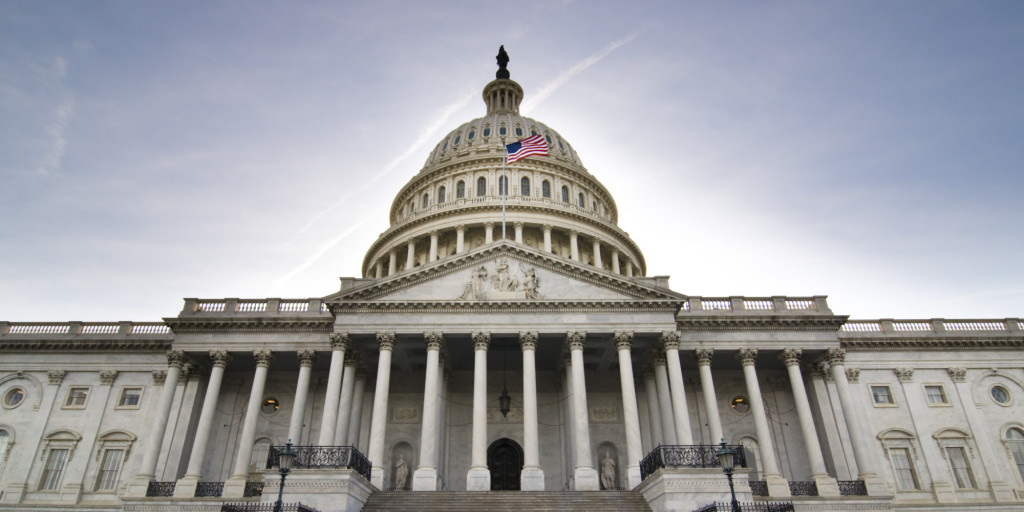Bipartisan ‘red flag’ gun laws plan has support in congress

Despite frequent mass shootings, Congress has proved to be unable to pass substantial gun violence legislation, largely because of resistance from Republicans. But a bipartisan proposal by Sens. Lindsey Graham, Republican-South Carolina, and Richard Blumenthal, Democrat-Connecticut, is gaining momentum following weekend mass shootings in Texas and Ohio that left 31 people dead. The emerging plan would create a federal grant program to encourage states to adopt “red flag” laws to take guns away from people believed to be dangers to themselves or others. A similar bill never came up for a vote in the GOP-controlled Senate last year, but both parties express hope that this year will be different. President Donald Trump has signaled support for the plan. “We must make sure that those judged to pose a grave risk to public safety do not have access to firearms and that if they do those firearms can be taken through rapid due process,” Trump said in a White House speech on Monday. Many mass shootings “involved individuals who showed signs of violent behavior that are either ignored or not followed up on,” said Graham, chairman of the powerful Senate Judiciary Committee. “State red flag laws will provide the tools for law enforcement to do something about many of these situations before it’s too late.” In an interview Tuesday, Blumenthal said there’s “a growing wave of support on both sides of the aisle” for the red-flag plan — more momentum in fact “than any other gun violence plan” being debated in Congress, including a proposal Blumenthal supports to require universal background checks for gun purchases. A closer look at red flag laws, which have been adopted by at least 17 states and the District of Columbia, including a law set to take effect Aug. 24 in New York. Most of the laws have been approved since the February 2018 mass shooting at Marjory Stoneman Douglas High School in Parkland, Florida. HOW DOES A RED FLAG LAW WORK? In general, red flag or “extreme risk protection order” laws allow courts to issue temporary orders barring someone from possessing guns based on some showing of imminent danger or a risk of misuse. State laws vary, but most stipulate that only specific people — usually family or household members — may petition a court for an extreme risk protection order. In some cases, a preliminary order may be granted without prior notice to the person who is the subject of the order. Such an order typically is brief, ranging from a few days to about three weeks. Once the person who is alleged to pose a risk of gun violence has been given an opportunity to respond, a more permanent order may be granted, typically for up to a year. Importantly to Graham and other supporters, before an order can be entered, some factual showing must be made that the subject of the order poses a risk of using a firearm to harm themselves or others. WHAT IS THE FEDERAL PROPOSAL? Graham and Blumenthal are still developing the plan, but a similar bill proposed last year by Florida Sens. Marco Rubio and Bill Nelson essentially would pay states to implement red flag law programs. A bid last year by Graham and Blumenthal to let federal courts keep guns away from people who show warning signs of violence failed to generate political support. Blumenthal called the failed effort to create a federal program a learning experience and said the new proposal would set a national standard that states must meet in order to be eligible for federal grants. He compared it to federal highway laws where grants are dependent on states setting speed limits or drunk-driving standards. “If you have speed limits, you get the money,” he said, adding that the red flag law would operate on the same principle. HOW MUCH WOULD IT COST? Costs are still being worked out, but whatever the amount, “it’s a small fraction of the losses — both monetary and in the loss of life — as a result of gun violence,” Blumenthal said. WHO SUPPORTS THE PLAN? Nearly all Senate Democrats support red flag laws, along with a growing number of Republicans, including Pennsylvania’s Pat Toomey, Indiana’s Mike Braun and Iowa’s Chuck Grassley, a former Judiciary chairman. South Dakota Sen. John Thune, the second-ranking Senate Republican, told the Argus Leader in Sioux Falls that he’s “confident Congress will be able to find common ground on the so-called ‘red flag’ issue.” Sen. Rob Portman, Republican-Ohio, told reporters Tuesday he is open to the proposal, noting that the alleged shooter in Dayton, Ohio, had so-called kill lists of intended targets. “Clearly people knew something was wrong with this guy, and yet nobody went to the proper authorities or the proper authorities didn’t respond,” Portman said. A red flag law may “bridge this issue of the guns and the mental health issue, where you identify somebody who has a mental health history that might not be formally diagnosed, but that people know about,” he said. WHERE IS SENATE MAJORITY LEADER MITCH MCCONNELL? The Kentucky Republican, who has adopted the nickname the “Grim Reaper” to celebrate his success at blocking Democratic bills, is widely considered the single biggest roadblock to changes in gun laws or any significant legislation in Congress. McConnell has not publicly indicated a position on red flag laws but said in a statement Monday that “Senate Republicans are prepared to do our part” to address gun violence. He said he has spoken with Graham and other committee chairs and asked them to consider “potential solutions to help protect our communities without infringing on Americans’ constitutional rights.” Congress passed a modest measure last year to shore up the federal background checks system and approved a grant program to prevent school violence — signs that action on gun violence is possible, McConnell said. WHAT ABOUT THE NRA? A National Rifle Association spokeswoman declined to comment. In a statement, the group said it welcomes Trump’s call “to address the root causes
Luther Strange reviews complaints over ‘no guns allowed’ signs in Tuscaloosa, Birmingham and Clay

Signs banning guns at various locations across the state have been removed following a series of complaints concerning possible unlawful prohibitions of firearms in Tuscaloosa, Birmingham and Clay, Alabama Attorney General Luther Strange said Monday. Signs banning guns at the Tuscaloosa Public Library, Birmingham’s Boutwell Auditorium and Railroad Park and Clay City Hall have been removed after AG Strange reviewed and investigated each complaint, where appropriate, worked with the public entity to achieve compliance with state law. After the removal and assurances residents’ rights to carry would not be abridged, no further action was deemed necessary by Strange. Strange’s Monday announcement is among nearly 30 similar statements he has made since July 2015 after investigating formal complaints about violations of Alabama’s firearms law by state government entities. Each complaint triggers a review from the state attorney general. The results of the attorney general’s investigations are summarized below, along with links to his determinations. Tuscaloosa Public Library The Attorney General’s Office reviewed a complaint that the Tuscaloosa Public Library failed to comply with Alabama law because it prohibited firearms. After the Attorney General communicated with the Tuscaloosa Public Library, the signs prohibiting firearms were removed. Because the signs are removed, the Attorney General has determined that no further action is required. City of Birmingham The Attorney General’s Office reviewed a complaint that the City of Birmingham failed to comply with Alabama law because it prohibited firearms at Boutwell Auditorium and Railroad Park. After the Attorney General communicated with the City, the signs prohibiting firearms were removed. Because the signs are removed, the Attorney General has determined that no further action is required. City of Clay The Attorney General’s Office reviewed a complaint that the City of Clay failed to comply with Alabama law because it prohibited firearms at City Hall. After the Attorney General communicated with the City, the signs prohibiting firearms were removed. Because the signs are removed, the Attorney General has determined that no further action is required.
Bob Sparks: Praying for victims and for solutions going forward

On Nov.13, Islamic radical terrorists killed 130 innocent people in Paris. The world mourned with the French and offered thoughts and prayers. Some of us added the French flag overlay to our social media pages. The perpetrators were bent on killing as many “infidels” (or Muslims if they happened to be in the vicinity) as possible. France, as a country, huddled together and shared their collective grief. Nearly all of America came together to mourn with America’s oldest friend. On Dec. 2, Tashfeen Malik and her husband, Syed Farook, slaughtered 14 government workers in San Bernardino, California. When the reality of the carnage became known, this country reacted far differently than our friends in Paris. It is safe to say that most Americans who believe in God may have looked upward and asked, “Why?” Others then offered thoughts and prayers to the victims and their loved ones. It was both incredible and sickening to see such a normal human reaction openly mocked and demeaned by callous liberals and atheists. Their rebuke to those seeking and offering comfort was on the front page. The New York Daily News, in true tabloid fashion, screamed “God Isn’t Fixing This” in letters large enough to consume most of the front page. That editorial on the news pages was in reaction to the public comments by prominent Republicans offering “thoughts and prayers.” Democratic U.S. Sen. Chris Murphy of Connecticut took to Twitter to respond: “Your ‘thoughts’ should be about steps to take to stop this carnage. Your ‘prayers’ should be for forgiveness if you do nothing – again.” Murphy is just one example of a full-throated verbal assault on the National Rifle Association, blaming the organization, and CEO Wayne LaPierre in particular, for the attacks. Again, the New York Daily News is speaking for those of that mindset. “He’s a terrorist,” blared the headline surrounding a picture of Farook. Further down, the words “But so are these guys” hover above photos of recent domestic terrorists, whose names must not be remembered. Then, to the lower right, the paper posts a photo of LaPierre below the words “(AND this guy)” What the Daily News and thoughtful people have in common is the outrage that mass shootings keep happening in this country. We agree that aggressive steps are necessary to prevent a wave of future attacks. Those who think the guns are the sole problem also talk about “common-sense” gun regulation. What does that mean? I am not here to defend the NRA (I am not a member), but look at Paris. France has some of the strictest gun laws in the world. Let that sink in for a moment and then ask what good did that do to prevent the terrorist attack? The polls say a large majority of Americans support tighter gun laws. That’s perfectly understandable. Americans are looking for ways to make such killings stop. Why didn’t gun control work in France? Because it’s easy to buy the weapons on the black market, then bring them across the open borders throughout Europe. Let us say we pass French-style gun laws: How does that solve the problem? The ability of terrorists to bring themselves and illegal weapons across our borders is almost as easy as it is in France. Fully securing our borders would be one way to prevent future terrorist attacks such as the one carried out in San Bernardino. It would actually keep bad guys and guns from entering our communities. Why does that never get beyond the talking stage? “Common-sense” reforms should be open for discussion. For instance, is the “gun show loophole” resulting in guns getting into the wrong hands and used for criminal purposes? If it is a genuine problem, let’s talk. We are now at an advanced stage on the danger meter. ISIS is attracting more followers in this country. Another way to protect our citizens would be to do what it takes to defeat ISIS. It is tough to attract recruits to a losing cause. That will take commitment and leadership. It is a sorry state of affairs when a terrorist attack causes liberals to forget who did the killing. Wayne LaPierre and those praying for the dead are not responsible for it. That belongs to Farook and Malik, and those who support them. I will run the risk of earning the wrath of unhinged liberals and atheists by quoting from a piece by Emma Green, managing editor of the The Atlantic’s online site. Commenting on the obscene backlash against prayers for the victims, she wrote: “The most powerful evidence against this backlash toward prayer comes not from the Twitterverse, but from San Bernardino. ‘Pray for us,’ a woman texted her father from inside the Inland Regional Center, while she and her colleagues hid from the gunfire. Outside the building, evacuated workers bowed their heads and held hands. They prayed.” Amen. Bob Sparks is a business and political consultant based in Tallahassee. For more state and national commentary visit Context Florida.
Jeb Bush, Hillary Clinton display the political divide over gun control

Presidential hopeful Jeb Bush and other Republicans declared their opposition to stiffer gun laws Friday in the aftermath of the Oregon college mass shooting, while Democratic candidate Hillary Rodham Clinton called for a national movement to counter the power of the National Rifle Association. Bush said more government isn’t always the answer whenever tragedy strikes — “stuff happens, there’s always a crisis.” President Barack Obama called him out on that remark, which Bush said was not about the Oregon shooting. “I think the American people should hear that,” Obama said, and “can decide whether or not they consider that ‘stuff happening.’” Clinton told supporters at a South Florida community college that she would willingly take on the NRA in a bid to achieve “new, effective gun control measures.” “What is wrong with us,” Clinton asked, “that we can’t stand up to the NRA, to the gun lobby and the gun manufacturers they represent?” Bush referred to the shooting that left 10 dead at the Oregon community college, including the gunman, while answering questions from South Carolina Attorney General Alan Wilson. The Republican attorney general, who hosted Bush at Furman University, first asked Bush about his stance on the Second Amendment, without reference to the school killings. Emphasizing that he supports the Supreme Court’s affirmation of bearing arms as an individual right, Bush talked about the many Floridians who have concealed-weapons permits and recalled receiving an award from the NRA. “Charlton Heston gave me a gun on stage in front of 15,000 people,” he said. “That was pretty cool, to be honest with you.” Turning to the Oregon killings, he called them “heartbreaking” but added that “the impulse in Washington is to take people’s civil rights away from us, and it won’t solve the problem.” Wilson followed-up with his own reference to mass shootings, and Bush continued, “We’re at a difficult time in our country, and I don’t think more government is necessarily the answer to this. “It’s very sad to see, but I resist the notion — I had this challenge as governor — we have — stuff happens, there’s always a crisis, and the impulse is to do something, and it’s not necessarily the right thing to do.” Asked later about his comments, he told reporters they were “not related to Oregon — just clarity here.” He appeared sensitive to the possibility of his comments becoming a controversy in themselves. “Let’s make sure here that we don’t allow this to get out of control,” he said. “There are all sorts of things that happen in life.” He cited a child drowning in a pool whose parents then want legislative action. “Sometimes, you’re imposing solutions to problems, and it doesn’t fix the problem and takes away people’s liberty and rights,” Bush said. “That was the point I was trying to make.” To be sure, Bush’s Republican rivals echoed his bottom line. “Before we start calling for more laws, I think we ought to consider why we don’t enforce the laws that we have?” Carly Fiorina said in Aiken, South Carolina. She said Obama’s response was “premature at best and at worst a really unfortunate politicization of this tragedy.” For Clinton, it was an opportunity to draw a clear distinction. She called Thursday’s mass murder “sickening” and said people should not be “afraid to go to college, a movie theater, Bible study.” The NRA, she said, “counts on really having an intense and dedicated group to scare politicians who say ‘we will vote against you.’” She credited her husband, former President Bill Clinton, for taking on the NRA and achieving tougher gun controls, and said, to roaring applause, “We are going to take them on again.” Obama spoke of a mismatch between Americans’ willingness to tighten gun laws and the powerful influence of pro-gun groups. “They know how to scare politicians,” Obama said. “The American people are going to have to match them in their sense of urgency if we’re going to actually stop this.” He said the Republican Party is “just uniformly opposed to all gun safety laws.” He also suggested some of the opposition was personal, driven by critics who think any gun laws “are an assault on freedom or communistic or a plot by me to take over” and stay in power forever. Even so, Democrats, too, have been a hard sell on gun control in Congress, an issue they have rarely pushed for years because it has been regarded as troublesome. Republished with permission of the Associated Press.
State gun laws fix take effect this week

A slew of new laws restricting access to guns for mentally ill Alabamians took effect on Tuesday. Residents convicted of any state designated “crime of violence”; misdemeanor domestic violence; or anyone adjudicated mentally unsound or under order of protection can now no longer legally purchase a gun. All residents involuntarily committed for mental illness-related reasons must now be reported to the state by local probate judges (a decision which can be appealed), as must anyone awarded a “not guilty” verdict in a criminal case using an insanity defense. Tuscaloosa state Rep. Chris England – who proposed the law signed over the summer by Gov. Robert Bentley – told AL.com the laws weren’t meant to rein in access specifically for Alabama residents, but rather to bring state statute in line with federal law so the statutes can be enforced by local law enforcement. The legislation “expands it to where the feds already are and hopefully will provide further protection for those in domestic violence situations or prevent those with a mental illness from legally purchasing a weapon,” the Republican lawmaker said. The now-enacted bill also contains two expansions of Yellowhammer State residents’ rights to bear arms: minors are now legally allowed to carry a pistol for training or hunting purposes or for organized competitions; and employees – public or private sector – are now cleared to keep a firearm in their personal vehicle while parked or operated in a parking lot. The new law also gives teeth to one already extant, but unenforced state statute. Carrying a firearm into a facility marked with guards, barriers and signs to the effect of prohibiting firearms is now punishable as a Class C misdemeanor.
Alabama newspapers editorial roundup

Tuesday: The Anniston Star on being caught up in the crossfire of health care law opposition: Todd Gardenhire and Luis Lang aren’t household names, but their recent experiences with health care speak loud and clear about Obamacare and how it’s perceived by some Americans. Gardenhire is a Tennessee state senator from Chattanooga. This year, he joined his Republican colleagues on the Senate Health and Welfare Committee to kill a proposal to expand Medicaid coverage to 280,000 working Tennessee residents who can’t afford health insurance. When a proponent of the expansion pointed out that “virtually every member of the Tennessee General Assembly receives some form of tax-subsidized health care,” Gardenhire took exception. “I have very nice health care provided to me through my private employer,” he said. “My wife’s on Social Security.” Only later did the senator come to realize that, yes, the state of Tennessee is picking up a big chunk of the costs of his health insurance. According to a new report in The Tennessean, the state has paid almost $31,000 of Gardenhire’s insurance bill since 2008. The senator now says he asked to be dropped from the state coverage. There’s no form, however, to forgo the shame of being an uninformed blowhard. Lang’s story is much more heartbreaking. The Fort Mill, South Carolina, resident is in very real danger of losing his eyesight. Diabetes is the central reason for the bleeding in his eyes and a partially detached retina, according to an article in The Charlotte Observer. The problem is that Lang, 49, doesn’t have health insurance to cover the costs of surgery and the medical bills for treatment has drained his savings. Paying out-of-pocket was fine for Lang and his wife until February when he had a series of small strokes and his vision weakened. “He’s in a very bad situation,” Malcolm Edwards, Lang’s ophthalmologist, said. “The longer he waits, the poorer his results will be.” Several factors are working against Lang: Lang, a Republican, had previously defied the Obamacare mandate to purchase health insurance. By the time he applied for Obamacare, he had missed the enrollment date for this year. Unable to work and earn money as a self-employed handyman, his income is too low to qualify for subsidies to purchase private insurance. South Carolina is one of many states that has thus far refused to expand Medicaid to cover those who are trapped like Lang. (And, yes, Alabama is one of them, as well.) Who’s to blame for this crisis? Is it Lang, who by his own admission is a smoker and hasn’t been diligent in treating his diabetes? Is it South Carolina’s Republican-dominated elected leadership that refuses to expand Medicaid? It’s President Barack Obama and congressional Democrats, say the Langs. “We call it the Not Fair Health Care Act,” said Mary Lang, Luis’ wife. In a larger sense, the culprit is one of political leadership at the top of the Republican Party. It’s House Republicans who voted dozens of times to repeal it. It’s a relentless judicial assault on the law by conservative activists. It’s a slate of 2016 GOP presidential wannabes promising to tear the law apart. It’s members of Congress who won’t make peace with Obamacare and yet won’t offer a viable alternative. By this measure, Gardenhire and Lang are caught in the crossfire of an ideological war that shows no sign of ceasing. Online: http://www.annistonstar.com • • • Tuesday Dothan Eagle on special needs children: There’s been a lot of gloom and doom coming out of Montgomery, where Alabama lawmakers are charged with the task of balancing the state’s General Fund and looking for ways to close a gaping divide between revenue and expenses. We’ve all heard about the possibility of shutting down half of the state parks, decimating the state trooper force and other draconian measures. One has to wonder if the threats are empty, perhaps simply saber-rattling to make tax hikes and/or gambling expansion seem like the lesser evil. Regardless, turning special needs children into pawns in a political game is unconscionable, but that’s exactly what has happened. On Monday, people gathered at Vivian B. Adams School in Ozark to protest a potential $35 million reduction in mental health funding. The number is misleading, because the loss of that $35 million would mean the state couldn’t receive another $64 million in matching funds from the federal government. Mental health care programs in Alabama would lose a whopping $99 million. Lawmakers should have to see firsthand how their decisions will affect Alabama families. They had an opportunity in Ozark on Monday, but only one of 140 Alabama lawmakers showed up: Rep. Steve Clouse, the chairman of the House Ways and Means Committee, who lives in Ozark. We applaud Rep. Clouse for attending the rally and speaking with concerned residents, and appreciate his willingness to deliver their message to his colleagues in Montgomery. We wish he could take the clients of Vivian B. Adams School with him. If Alabama lawmakers had to look into the faces of clients like Diane Kautz‘s daughter, for whom the school is the “happiest place on earth,” they’d surely find a way to keep funding intact. Online: http://www.dothaneagle.com • • • Wednesday Decatur Daily on handguns: There are few public servants we respect more than law enforcement officers. As honest Americans and Alabamians, we have reason to take note of our appreciation to the men and women who patrol our cities, counties and state. Most of us can point to at least one specific instance when an officer responded in a time of need. It’s too bad we don’t think of such moments when we elect politicians who create laws that make their jobs harder and more dangerous. The so-called Second Amendment laws passed by our politicians, who pander to our most base and sometimes irrational fears, are a shining example. It was never hard to buy a gun in Alabama. And no one ever threatened to take them away. Yet some of our least sincere, or


